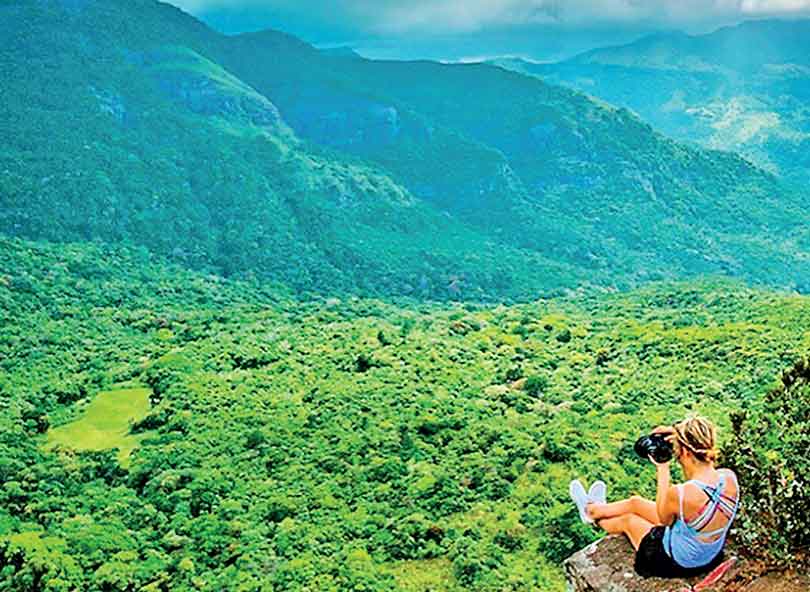Thursday Feb 19, 2026
Thursday Feb 19, 2026
Tuesday, 10 December 2024 03:16 - - {{hitsCtrl.values.hits}}

There is little peer-reviewed research that has examined the environmental and social impacts of tourism development in Sri Lanka
Introduction
 Tourism is an important element of contemporary life in Sri Lanka and other countries and like many aspects of modern society, is challenged by exceptional change and disruption. People in Sri Lanka are struggling to meet the global challenges of climate change, development and participatory governance. As Sri Lankans we are facing loss of our traditional culture, language architecture, and social structures. Hence challenges signal that the tourism industry needs a compatible strategy so that it can contribute to global sustainability and progress.
Tourism is an important element of contemporary life in Sri Lanka and other countries and like many aspects of modern society, is challenged by exceptional change and disruption. People in Sri Lanka are struggling to meet the global challenges of climate change, development and participatory governance. As Sri Lankans we are facing loss of our traditional culture, language architecture, and social structures. Hence challenges signal that the tourism industry needs a compatible strategy so that it can contribute to global sustainability and progress.
This gauge is to boost the industry’s capacity to create and acquire knowledge. Specifically, its transfer denotes how knowledge and ideas move from the sources to the potential stakeholders who are users of that knowledge. Over the past decade, the concept of knowledge transfer has evolved to reflect the collaborative and iterative processes involved in its creation and exchange. This broader understanding now includes attention to the dynamic ways in which knowledge is co-created and shared across different disciplines and organisational boundaries.
Importance of research studies
In a globally emerging knowledge-based society, the ability to transfer it within and between tourism organisations has been found to contribute to their innovativeness and competitiveness. Academic institutions are actively generating fresh perspectives and knowledge in the field of tourism, while often the tourism industry “actively” ignores this stockpile. Likewise, academics are sometimes criticised for not offering practical insights or real-world applications in their teaching and research. Meanwhile, governments frequently formulate policies without consulting a wider range of stakeholders, overlooking the socioeconomic impact and reach of tourism at local, national, and global scales.
Thus, it is important to build bridges so that ongoing tourism research outcomes find their way to the industry and the “know-how” lodged at the latter is channelled to the academia and knowledge institutions. Although there have been previous efforts in this direction, they have been inconsistent and uncoordinated.
Knowledge gap in sustainable tourism research in Sri Lanka
The knowledge gap is that which needs to be filled by new research on sustainable tourism either because we know little or nothing. There is limited knowledge in the sustainable tourism literature on conceptualising approaches to knowledge contribution (e.g., Bramwell, 2015; Sigala, 2021; Xin, Tribe, & Chambers, 2013). In terms of understanding the sociocultural and environmental impacts, the limited available studies underscore the threat of tourism to revolutionary.
As Sri Lanka aims to rapidly increase the number of international tourism arrivals on the island, the sector is poised to face several challenges, including the need for foreign direct investment, infrastructure development, and the high costs of imported goods. At present, there is little peer-reviewed research that has examined the environmental and social impacts of tourism development in Sri Lanka, as well as little published on the perspectives of Sri Lankans.
Being a biodiversity hotspot Sri Lanka is one of the favourite research destinations for botanists, zoologists, oenologists and environment scientists. Although the country’s Flora and Fauna Protection Ordinance and other related laws prevent foreign nationals conducting independent research, the foreign students, researchers can join with universities to conduct their interest of research disciplines.
The discussion of these gaps in knowledge is offered in part as an agenda for research and development strategy for sustainable tourism in Sri Lanka.
Demand for sustainable tourism research
With such limited research, it is difficult to critically reflect on which models of sustainable tourism development in Sri Lanka are currently successful in terms of minimising negative impacts and optimising positive gains, let alone future tourism development opportunities. Although more research is urgently needed, numerous barriers impede the expansion of data collection to help fill the knowledge gaps identified sustainable tourism development in Sri Lanka research in tourism has been slow to develop. Reasons for this may be:
A preoccupation with promotion has tended to favour large funding for promotion and little for research.
A widespread lack of awareness regarding the vast and complex nature of the tourism industry.
A general scepticism about the transformative potential that well-structured research can offer.
The tourism industry does not pay much direct attention to research (Buckley, 2008b; Lane, 2009). If academics can understand what the industry is doing and why. So then that information contributes to government policy and regulation which improve sustainability. However, there are three key sectors of tourism that could greatly benefit from research findings. These include:
As key developers of tourism infrastructure—such as water systems, waste management, law enforcement, fire protection, and attractions—governments require accurate information to create informed policies and take effective action.
Commercial enterprise needs the results from studies of traveller trends as well as factors contributing to better business success.
Non-profit organisations require more comprehensive information about their roles as developers and managers of key aspects of tourism, such as museums, festivals, events, and cultural attractions, to ensure they operate in a sustainable way.
Sri Lankan universities have the capability to conduct research on sustainable tourism that can effectively contribute in enhancing the competitiveness of destinations and local the small and medium enterprises. When these entities work together and share their competencies, innovation potential is enabled.
Conclusion
Because of the limited research on the sustainable tourism subject in the Sri Lankan context, it is vital to identify some immediate priorities for academic research aimed to improve the sustainability of the tourism industry in reality in Sri Lanka.
References:
S. Xin et al. Conceptual research in tourism Annals of Tourism Research (2013)
Sustainable tourism: Research and reality Author Buckley, Ralf Published 2012
(The writer holds a BSc, E.D.B.A, M.B.A, M.M.M, and is a Lead Auditor (ISO 9001, 14001, 45001) Exemplar Global Sydney Australia, Managing Director – Praguna Management Ltd., and Visiting Lecturer – University of Colombo, IHR University of Colombo, CINEC Campus.)